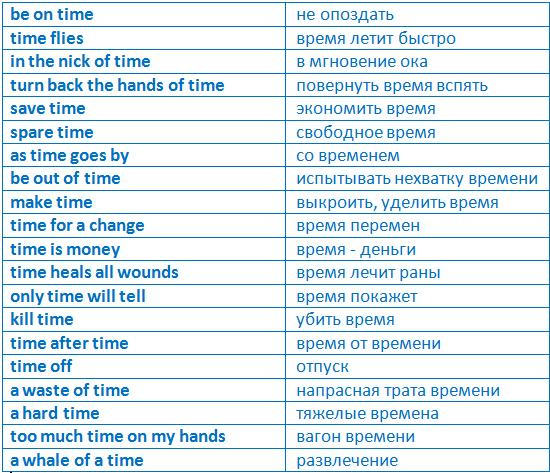English Idioms Course
ahead of one’s time = having ideas or attitudes that are too advanced for the culture/society at the moment
My grandmother was ahead of her time – she opened her own company in an era when there were few women in the business world.
behind the times = old-fashioned, not keeping up with current developments
Bob is a bit behind the times – he doesn’t know how to use a computer, much less a smartphone!
a race against time = a situation when you need to rush to do something before the deadline (time limit)
The last day for submitting project proposals is one week from today – so now it’s a race against time.
in the nick of time = at the last moment before it’s too late.
We got to the airport in the nick of time – if we’d arrived 15 minutes later, we would’ve missed our flight.
have the time of your life = have a super wonderful experience
My kids had the time of their lives at Disney World.
have a devil/hell of a time = a very difficult experience
I’m having a devil of a time trying to install this software – every time I try, I get a different error message.
bide your time until = wait patiently for a good opportunity
He was just biding his time until he got a chance to work at his dream job.
catch at a bad time = attempt to speak to someone in a moment that is inconvenient for him/her
Hi Peter! You caught me at a bad time – I’m about to go into a meeting. Could I call you back in an hour?
have a lot of time on your hands = have a lot of free time (maybe too much)
That guy completely covered the walls of his room with colored pencil drawings. He must have a lot of time on his hands!
all in good time = it will happen when the time is right, so be patient
“Why is it taking so long for my career to take off??”
“All in good time… just keep working hard and you’ll make it.”
only a matter of time = it will definitely happen sooner or later
The company has lost money for the third year in a row; it’s only a matter of time before it goes bankrupt.
time will tell = the passing of time will show the result, whether good or bad
“I was surprised that Bill and Jackie got married. Do you think they’ll be happy together?”
“Only time will tell.“
stand the test of time = last for a long time and continue to be successful
This is a classic work of literature. It has stood the test of time.
the time is ripe = it is the best time to do something
Real estate prices are low, and we have a lot of money saved up – I think the time is ripe for us to buy a house.
Ripe fruit is at the perfect moment to eat!
two-time = deceive, betray, or cheat someone
You two-timing bastard! You’ve been seeing another woman for the entire time we’ve been engaged!
the big time = the highest or most profitable level
She made it to the big time with the launch of her latest novel – it sold hundreds of thousands of copies in the first week.
time flies = time passes very quickly
Your son is already 12 years old? I remember when he was a baby! How time flies…
Another expression: “Time flies when you’re having fun” – Time passes more quickly when you’re doing something you enjoy
time heals all wounds = the passing of time makes emotional injuries get better
Right now she’s very upset that her boyfriend broke up with her, but you know what they say: Time heals all wounds.
time is of the essence = correct timing is very important (often used for things that are urgent)
In order to meet the deadline, you need to send us the contract by Monday – time is of the essence.
third time’s the charm = the third time you try something, it will work (when the previous two attempts have failed)
I’ve called her twice, but she hasn’t answered. Let me try again – the third time’s the charm.
Elementary
Pre-Intermediate
Intermediate
Время – одна из главных ценностей в нашей жизни. Важно уметь управлять им правильно. Это умение начинается, в частности, со способности выразить свои мысли о времени на разных языках, если вы ими увлекаетесь. На страницах нашего сайта можно научиться это сделать по-английски. Мы предлагаем вам 20 устойчивых выражений с переводом и примерами использования со словом time – время.
-
be on time – не опоздать
‘The trains always run on time in my country. They are never late.’
-
time flies – время летит быстро
‘Time flies when you are having fun.’
-
in the nick of time – в мгновение ока
‘My team scored in the nick of time. The game was in the last few seconds.’
-
turn back the hands of time – повернуть время вспять
‘If I could turn back the hands of time, I wouldn’t have done what I did.’
-
save time – экономить время
‘We will save time if we drive instead of taking the bus.’
-
spare time – свободное время
‘In my spare time I like to learn English.’
-
as time goes by – со временем
‘As time has gone by I have become less interested in going to nightclubs on the weekends.’
-
be out of time – испытывать нехватку времени
‘Please stop writing. You are out of time. The exam has finished.’
-
make time – выкроить, уделить время
‘I know that you are busy, but you will have to make time to attend the meeting.’
-
time for a change – время перемен
‘After working in the same job for 5 years, I now feel like it is time for a change.’
-
time is money – время — деньги
‘I can’t wait here all day. Time is money, you know?’
-
time heals all wounds – время лечит раны
‘I was sad for a long time after I broke up with my boyfriend, but time heals all wounds. I’m fine now.’
-
only time will tell – время покажет
‘Will we ever have peace in the world? Only time will tell.’
-
kill time – убить время
‘We’ve got 4 hours until our flight leaves. What are we going to do until then? How are we going to kill time?’
-
time after time – время от времени
‘Time after time Tom was late for school. His teacher told him if he was late again he would be in big trouble.’
-
time off — отпуск
‘You are working too much. You need to take some time off.’
-
a waste of time – напрасная трата времени
It’s a waste of time calling that company. They never answer the telephones.’
-
a hard time – тяжелые времена
‘She’s had a hard time recently; she lost her job and then her mother died.’
-
too much time on my hands – вагон времени
‘He watches so much TV because he has too much time on his hands.’
-
a whale of a time — развлечение
‘I had a whale of a time at your party. Please invite me to your next one.
Considering that time is such a critical element in our lives, it’s no surprise that the word time should crop up so often in English idiomatic usage. Here’s a list of phrases that refer directly to time.
1. a devil of a time: said of an ordeal
2. a legend in one’s own time: one who gains renown within his or her lifetime (also inspired “a legend in (one’s) own mind,” referring to an egotistical person who believes himself or herself to be more significant than he or she actually is)
3–4. a matter/question of time: said in reference to a state that will soon change
5. a rare old time: an enjoyable experience
6. a race against time: said of trying to accomplish something critical in a short time frame
7. a stitch in time: the first half of a proverb (ending with “saves nine” and with an obscure origin) that refers to the wisdom of taking precaution
8. a whale of a (good) time: an especially exciting or fun experience
9. ahead of time: before the agreed time
10. ahead of (one’s) time: said of someone or something that has an innovative approach or style or one that the world is not ready for
11. all in good time: an expression that encourages patience
12. all the time in the world: an unlimited amount of time
13. all the time: in addition to referring to habitual or continuous occurrence, can refer to knowing about something throughout a given period
14. at a set time: at the agreed time
15. at all times: always
16. at no time: never
17. at the appointed time: at the agreed time
18. bad time: an inconvenient moment or an unfortunate experience
19. before (one’s) time: said of something that existed or occurred before one was born or when one was too young to recall that thing, or said in reference to someone’s unexpectedly early death
20–21. behind its time/the times: late, not keeping up, or obsolete
22. bide (one’s) time: be patient
23. big-time operator: someone who is or thinks he or she is important or influential
24. big-time spender: one who spends a lot of money, or said ironically about a frugal person
25. borrowed time: an uncertain amount of time, at the end of which something will no longer exist or occur
26. buy time: postpone an event for one’s advantage
27. by the time: said in reference to a time after something else has occurred
28. caught in a time warp: unchanged in an antiquated or obsolete way
29. crunch time: a critical period
30. face time: time spent in someone else’s company
31. for the time being: for now
32. from time to time: occasionally
33. do (the) time: serve time in jail or prison
34. down time: rest period
35. get the time: become available
36. give (one) a hard time: be critical
37. good-time Charlie: one who seeks pleasure
38. good times: pleasant experiences
39. hardly have time to breathe: said when one is busy
40. have a time of it: experience difficulty
41. having quite a time: having a pleasurable experience, or having difficulty
42. have time on (one’s side): don’t have to hurry
43. I’ll catch you some other time: I’ll talk to you later when it’s more convenient for you
44. in next to no time: almost instantly
45. in the fullness of time: after enough time passes
46. in the right place at the right time: in a figurative sense, fortuitously prepared for some eventuality; also, literally, located in a position that is advantageous or fortunate
47. it’s about time: said to express impatience, or relief that something has finally occurred (usually accompanied by an exclamation point)
48. it’s high time: it is the appropriate time; one has waited long enough
49. keep time: maintain the beat in music
50. lose no time: do something immediately
51. make good time: proceed quickly or in a reasonable amount of time
52. make time for: set aside a period of time to accommodate someone or something
53. make up for lost time: catch up on time wasted or as a result of going slowly or not going at all
54. mark time: wait
55. not able to call (one’s) time (one’s) own: too busy
56. old-time: old-fashioned
57. on time: punctual
58. once upon a time: long ago
59. out of time: said in reference to no longer having time to do something
60. pass the time (of day) with: chat with
61. pressed for time: lacking enough time to do something
62. run that by me one more time: say that again
63. sands of time: a poetic reference to the passage of time as represented by sand in an hourglass
64. the big time: said in reference to achieving prominence in some endeavor
65. the time has come: the occasion is appropriate
66. the time of (one’s) life: a memorable experience
67. time and tide wait for no man: the world makes no allowance for one being late
68. time bomb: something that will inevitably result in a negative consequence
69. time flies: a reference to the fleeting nature of time
70. time is money: time is important because using it wisely or unwisely affects one’s ability to earn money
71. time on (one’s) hands: spare time
72. time out: in sports, a short period when play ceases; by extension, a break from activity (also used as the announcement of a request for a time out, as is time by itself)
73. (stuck in a) time warp: said in reference to observing something that or someone who appears outdated
74. time was: there was a time when
75. time’s a-wastin’: time is running out
76. time to hit the road: time to depart
77. time works wonders: the passage of time resolves problems
78. when the time is ripe: when the time is appropriate
79. withstand the test of time: endure
80. wouldn’t give (one) the time of day to: ignored
Stop making those embarrassing mistakes! Subscribe to Daily Writing Tips today!
You will improve your English in only 5 minutes per day, guaranteed!
Subscribers get access to our archives with 800+ interactive exercises!
You’ll also get three bonus ebooks completely free!
You’re reading this because you want to learn English.
Some of the most used phrases in English are idioms and collocations. Collocation refers to a group of words that often go together.
I have taught about the importance of using collocations in my recent videos. Click here to learn more.
Well, the good news is that you’re about to learn different examples of idioms and collocations related to time. These can be easily used in everyday conversation!
Watch the lesson, read the article, and start implementing these learning strategies today:
1: It’s Time To or It’s Nearly Time To
This means that we need to do something or it’s the right time to do something at the moment.
Examples:
- It’s time to go. – You might be at a party and your children don’t want to leave, you can use this!
- It’s time I started exercising. – It means I need to start exercising, right now.
- It’s time you stopped smoking. – It can also be used as advice in a direct way.
- It’s about time! – This means that “it” should have happened sooner.
Sample Dialogues:
A: “How did the game go?”
B: “We won 2-1!”
A: “It’s about time you haven’t won for ages!”
A: “Guess what, we’re getting married.”
B: “It’s about time!”
2: On Time
This simply means that you are not late.
Examples:
- I always try to be on time.
- I might not always be there when you call but I am always on time.
- Be sure that you’re on time for that interview.
- Trains in the U.K. are hardly ever on time.”
Here’s another variation of this collocation: right on time. This means on time but JUST!
Examples:
- I was rushing to that interview, but I got there right on time.
- I think we’ll be there right on time.
3: Take Time or Take Your Time
This means no rush, no need to rush, just take your time.
Like what I said from my previous lesson about input:
- “Writing is a great skill to practice your output because you can take your time, there’s no need to rush.”
- “When leaving comments below take your time to ensure that you get your sentences correct.”
4: Take Time Off
This simply means to not go to work.
Examples:
- I’m gonna take a little bit of time off next week so, don’t expect me to reply to emails straight away.
- I think you need to take a little bit of time off because you seem very stressed at the moment.
5: Make Time For
This means to dedicate time to someone or something.
Examples:
- That new project is taking over everything, right now you need to make a little bit of time for me as well.
- I need to make some time for studying this week maybe I’ll take some time off work on Friday.
6: Free Time or Spare Time
This is the time you have after work or school. The time you have to dedicate for hobbies or interests.
Examples:
- What do you like to do in your free time?
- I don’t have a lot of spare time at the moment that’s why I’m not exercising enough.”
7: Have Time
We use this when we’re talking about dedicating time to a specific thing.
Examples:
- I don’t have enough time to study right now.
- I don’t have enough time to get speaking practice.
8: Have A Good/Great Time
This means to enjoy yourself, to make the most out of what you’re going to do with your time.
Examples:
A: “I’m just setting off for a wedding right now can we meet up next week?”
B: “Yeah, sure. Have a great time!”
“Have a great time tonight!”
9: Save Time
This means to be more efficient with what you do.
Examples:
- Let’s cut down on meetings to save some time. – “let’s cut down on something(usually something unnecessary)” means let’s reduce them to save time
- My new robot vacuum cleaner has saved me a lot of time because I don’t have to vacuum as much anymore.
10: Waste Time
This is the opposite of “save time”. It means to spend your time in an unproductive manner. Don’t worry, this is something natural. We all waste time, sometimes.
Examples:
- I waste a lot of time watching stupid videos on YouTube.
- Some people say playing computer games is a waste of time.
11: Spend Time
To spend time doing something. This just means what you do with your time.
Examples:
- He spends a lot of time working out.
- I spend too much time worrying about stupid things.
- How much time do you spend listening to Podcasts?
Idioms with the Word TIME
1. Buy Time
This simply means to delay something.
Here’s a sample scenario:
Maybe you’re in a bad situation. Let’s say you owe some money to somebody and you can say to your partner “Let’s try and buy some time.” Give a reason why you cannot pay it now, so you have extra time to pay it back later.
Another example is “We need to buy some time.”
2: Be In The Right Place At The Right Time
This is used a lot in sports, like football. But of course, it could just mean anything in life as well. It simply means you are at a location where something good is about to happen at just the time of its occurrence.
Examples:
- Strikers need to be in the right place at the right time in order to score a goal.
- It’s important to be in the right place at the right time.
3. Time Flies
Time goes by quickly when you are having a good time.
The best example is “Time flies when you’re having fun.”
4. Time Is Money
This is a common idiom that people use when we’re talking about how to spend your time wisely and not waste it. Time is a valuable resource and should not be wasted!
Example:
- If you are paid hourly, then you know that time is money.
FINAL THOUGHTS
I hope you enjoyed this lesson. If you did, share it with your friends. And then, download my book for free!
And if you want premium resources, join the To Fluency Program here.
By Robby Kukurs
If you are new here please read this first.
Hello my friends foreign English speakers!
As you may already know, the English Harmony blog is all about showing you how English fluency can be achieved by doing loads of spoken English practice in combination with acquiring plenty of naturally occurring speech patterns and using them.
And in case you’re wondering – what the heck is a “naturally occurring speech pattern” anyway? – just let me spell it out for you – it’s a phrase, an expression, a word combination.
So, this time around we’re going to look at English phrases involving the word TIME, and there’s a good chance that you haven’t heard all of them so this is going to be the perfect opportunity for you to expand your English phrase pool.
And please bear in mind – make sure to repeat these phrases out loud and say at least a few sample sentences. Just because you’re reading them, doesn’t mean you’ll be able to use them, you’re just going to add them to your passive vocabulary.
So, are you ready?
It’s about time – this is a very handy English phrase to have at your disposal, and it can be used whenever you want to indicate that something is about to begin, or maybe you want to finish a conversation with someone: “OK Jimmy, it’s about time we carried on with our work, we only have one hour left to go!” And did you notice something weird in the sample sentence? Yes, this phrase demands the Past Tense after it, so bear it in mind: “It’s about time I stopped this relationship”, “It’s about time we went inside, the storm is coming!”
Big time – no matter how short, even a two-word combination can be very useful and help you big time to express yourself properly in certain situations, and this one is no exception. Now, did you just notice I already used this phrase in the previous sentence? So, just to clarify – this phrase simply means “a lot”, and here’s another sample sentence for you: “Listen, have you forgotten that Mike helped you big time when you were in trouble? So now it’s your turn to help him!”
From time to time – this English phrase referencing time simply means “sometimes”, here’s an example: “I would have some issues with my car from time to time, but for the most part it’s running just fine!” And in case you’re wondering – “well, if it means “sometimes”, why can’t I just say “sometimes” instead?” – the answer is – well, yes, you can, but if you use a phrase like this one, it will make you sound more native-like and fluent!
This time around – this phrase implies that whoever is the person saying this, they’ve already been involved in the process before, basically this isn’t the first time they’re making the announcement. “Now, this time around we’re going to look at the following…” – from the context alone you can gather that this time is just one time in a series of repeated events.
Time and time again – typically this English time related idiom is used when someone wants to emphasize the fact that something is happening again and again, and more often than not the connotation would be a negative one: “I keep telling her time and time again that she should spend more time doing her homework, but she just doesn’t listen!”
There was this time when – this is a very handy way of telling a story about something specific that happened at some stage in the past. Personally I love this phrase as it allows you to captivate your listeners’ attention – “There was this time when I was working in a coffee shop, and you know who walked in one day? John Travolta, no kidding!”
Hitting an all-time high – this is somewhat an industry-specific phrase and would be used when discussing finances and economy: “Now, according to the latest reports, the level of unemployment in the region is now hitting an all-time high of 17.5% which is an outrageous figure!”
How are we fixed for time? – you’d be most likely using this phrase when starting a meeting or some sort of a formal conversation and making sure that the people involved won’t be running out of time anytime soon – “So, Max, Tracey, now I want to run over some quarterly sales figures with you, how are we fixed for time?”
A number of times – as simple as this English collocation is, it’s still a very valid phrase. It’s pretty self-explanatory, and here’s an example sentence where you can see this phrase in action: “I’ve taken that road a number of times, but I’ve never noticed there was a derelict building on the left, that’s weird!”
In the meantime – let’s start with an example so you can see exactly how this phrase is used: “OK, I’m going to check out this information for you, in the meantime, do you mind doing something else for me?” Basically this phrase is used to describe a process or an event which is taking place while something else is going on.
While at the same time – this is a very handy phrase to be used in situations when you have to describe two things one of which is being contrasted with the other one – “Have you noticed that Rashid is very quiet and keeps mostly to himself while at the same time Tanja is full of life and is always running around with other kids?”
Running out of time – I’m sure you’ve heard this one before, but in case you haven’t – this idiomatic expression describes a situation when there’s no more time left to get something done. “I’m sorry, but you’re running out of time and by the looks of it, you’re not going to be able to finish all the exam questions.”
Having a hard time – are you having a hard time developing your English fluency? Well – guess what? – I bet you don’t spend enough time opening your mouth and practicing your English, am I not right? Just to specify – “having a hard time” means having difficulties with something; in other words, it’s when you find something difficult.
* * *
Now, I hope you’ll find this phrase list useful my friends, and just to remind you, please make sure you read these phrases out loud and come up with a number of sample sentences for each.
Remember – if you don’t use it, you’ll lose it – and English phraseology and your ability to use it is no different!
Robby
P.S. Are you serious about your spoken English improvement? Check out my English Harmony System HERE!
P.S. Are you serious about your spoken English improvement? Check out the English Harmony System HERE!








